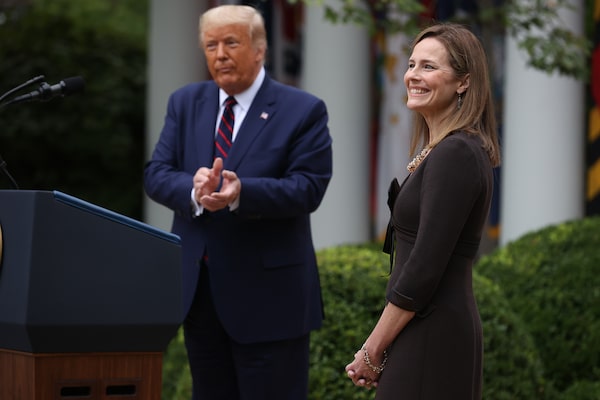
Seventh U.S. Circuit Court Judge Amy Coney Barrett smiles after U.S. President Donald Trump announced that she will be his nominee to the Supreme Court in the Rose Garden at the White House Sept. 26, 2020 in Washington, DC.Chip Somodevilla/Getty Images
Congressional Republicans are fast-tracking Amy Coney Barrett’s appointment to the U.S. Supreme Court, setting up a Senate confirmation vote just days before a presidential election that could be decided by the bench.
With little recourse to stop Ms. Barrett’s accession, Democrats are exhorting the electorate to punish President Donald Trump for the move. A 6-3 conservative majority on the court, they warn, could mean the end of health care coverage for pre-existing medical conditions and an overturning of abortion rights.
Mr. Trump on Sunday vowed to push Ms. Barrett’s appointment through without delay. And he repeated unsubstantiated claims that mail-in voting during the election would lead to widespread fraud, underscoring previous comments that he is counting on his Supreme Court pick to rule in his favour on election disputes.
“It’s going to go quickly,” Mr. Trump said at the White House. “I don’t think I’ve ever seen the Republican Party more unified.”
Ms. Barrett, a 48-year-old federal judge in Indiana, is a solidly right-wing choice for Mr. Trump’s third appointment to the high court. A former clerk for Antonin Scalia, Ms. Barrett named the late archconservative Supreme Court justice as her “mentor.”
“His judicial philosophy is mine too,” she said Saturday when Mr. Trump announced her nomination.
The Republican-controlled Senate will hold confirmation hearings Oct. 12 to 14, judiciary committee chairman Lindsey Graham told Fox News, leaving enough time to vote her onto the court before the Nov. 3 election.
Ms. Barrett’s rise could lock down conservative control of the Supreme Court for a generation. Most immediately, the court might have to resolve some of the dozens of lawsuits over election rules, in which Mr. Trump’s campaign is trying to make it harder to vote in key swing states such as Pennsylvania. Such cases could determine the election result by rejecting some mail-in votes. Earlier this week, the President told reporters that “we need nine justices” to prevent a “hoax with the ballots.”
The week after the election, the court is also set to hear arguments in a case, backed by Mr. Trump, that seeks to scrap the Affordable Care Act (ACA), better known as Obamacare. Getting rid of the law would axe coverage of pre-existing conditions for 100 million people and could deprive 20 million of all health insurance.
In addition, several conservative states are attempting to have the Supreme Court overturn Roe v. Wade, the 1973 decision that legalized abortion.
Ms. Barrett, a University of Notre Dame law professor before Mr. Trump appointed her to the federal court in 2017, has in articles and interviews criticized previous Supreme Court decisions that upheld the constitutionality of Obamacare. She has also said that she believed previous efforts by states to restrict abortion access were constitutional.
An average of 12 different polls by FiveThirtyEight found that 52 per cent of respondents believed the election winner should fill the Supreme Court seat left empty by the death of Ruth Bader Ginsburg, and 39 per cent said Mr. Trump should appoint someone now. When Mr. Scalia died in early 2016, Republicans blocked then-president Barack Obama from filling his seat, arguing that the president should not make such an appointment in an election year.
U.S. President Donald Trump nominated Amy Coney Barrett to the Supreme Court, and she pledged to become a justice in the mold of the late staunch conservative Antonin Scalia - another milestone in Trump's rightward shift of the top U.S. judicial body. Colette Luke has the latest.
Reuters
Democratic presidential nominee Joe Biden framed the confirmation fight as a battle over Obamacare’s popular protection for pre-existing conditions. He faces Mr. Trump in their first televised debate on Tuesday.
“President Trump sees a chance to fulfil his explicit mission to steal away the vital protections of the ACA from countless families who have come to rely on them for their health, their financial security and the lives of those they love,” Mr. Biden said in a speech Sunday in Delaware.
Sara Benesh, a Supreme Court expert at the University of Wisconsin-Milwaukee, said the Democrats have no way of blocking Ms. Barrett’s appointment. But the fight could motivate both sides of the country’s political divide.
“The death of [Justice Ginsburg] has seemed to galvanize the left in terms of fundraising. Perhaps it will also do so in terms of turnout. The social issue of abortion seems to be coming up a lot this election; a Supreme Court vacancy will make that all the more relevant,” she said.
Four Senate Republicans would have to break ranks to block the confirmation. So far, only two have said they oppose Mr. Trump’s move to fill the seat.
The Democratic campaign will reach directly into the hearing room. Senator Kamala Harris, the party’s vice-presidential nominee, sits on the judiciary committee. A former prosecutor, she has drawn plaudits at previous hearings for skewering Mr. Trump’s nominees, including Supreme Court Justice Brett Kavanaugh.
But Republicans could seek to use Democrats' attacks on Ms. Barrett against them. During her 2017 confirmation hearings for the federal court, Democratic Senator Diane Feinstein grilled Ms. Barrett on how her Catholic faith, which includes membership in a conservative sect called People of Praise, would affect her rulings. “The dogma lives loudly within you,” Ms. Feinstein admonished her.
The Republicans accused Ms. Feinstein of discriminating against Ms. Barrett on religious grounds. Mr. Trump took up this line on Sunday, accusing Ms. Barrett’s critics of “fighting a major religion."
Our Morning Update and Evening Update newsletters are written by Globe editors, giving you a concise summary of the day’s most important headlines. Sign up today.
 Adrian Morrow
Adrian Morrow